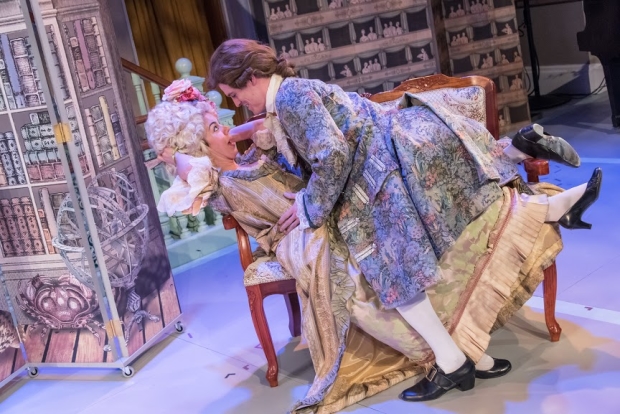The School for Scandal

(© Stratton McCrady)
No doubt Richard Brinsley Sheridan (1751-1816), playwright of the 1777 hit comedy The School for Scandal knew people like the characters he created, but he could not have expected them to remain evergreen. Although exaggerated in both speech and dress, his gossipmongers, social climbers, and hypocrites are certainly familiar. Who today has not encountered a cougar, such as Lady Sneerwell, out for an affair with a younger man; a philanderer like Joseph Surface, in search of a wealthy heiress; or the not-so-naive trophy wife who married an elderly bachelor like Sir Peter Teazle?
Sheridan's play serves as a structure for the audacious dialogue uttered by people determined to hoist themselves up the rungs of society, in contrast to the honest souls who prefer to keep themselves above the rumors. Sheridan's play is a gloss on the parlor game of telephone, in which something whispered is embellished beyond the truth.
The School for Scandal opens after Sir Peter Teazle has returned to London with his young and beautiful bride, Lady Teazle, fresh from the country and eager to find her place in society. She falls in with the vicious Lady Sneerwell and her nasty friend, Snake, along with their comrades, Mrs. Candor and Sir Benjamin Backbite, and tries to out-do their biting insults and slanders. Lady Sneerwell hopes to ensnare Charles Surface in an affair, but he is in love with Maria, the wealthy ward of Sir Teazle. Lady Sneerwell has formed an alliance with Joseph Surface, Charles' brother, who wants Maria and her money for himself, all while professing his good deeds and kindness. Maria will have none of Joseph, preferring Charles instead. Meanwhile, Sir Oliver Surface, the brothers' kindly uncle who has generously raised them, returns to London from a long sojourn in India. He means to secretly discover the true nature of his nephews, enlisting the help of his faithful servant, Rowley, and the money-lender, Moses.
Under the adroit direction of Paula Plum, the doubling of the performers in a multitude of roles adds a second layer of foolery to the comic characters. The actors know we get the joke, upping the pace of the frantic costume changes, to climax in the famous hide-and-seek screen scene. Lydia Barnett-Mulligan delivers a breakout performance as the wide-eyed, innocent Lady Teazle, out to imitate the cheats and liars, alternating as a glittering male Snake, complete with flickering tongue and elongated gestures, and culminating in a sinuous dance on the floor when he/she is undone.
Richard Snee, as the pragmatic Sir Oliver changes his waist-coat and demeanor into the hilarious Backbite, launching his foolish epigrams as if he believed himself Shakespeare. Sarah Newhouse appears as the stiff-backed Lady Sneerwell, in total command until her forgeries are discovered. Bobbie Steinbach as Mrs. Candor, lands her attacks with authority, finished by a carillon-like laugh that ends in a fit of choking before she rushes offstage to return as Moses, the ancient wheezing money-lender. Michael Underhill as Joseph Surface is true to his character's name with a selfish, mean streak beneath his pronouncements. Omar Robinson as his brother Charles is a good-natured party boy, surrounded by prostitutes, but hiding an honest heart. Gabriel Graetz as Sir Peter is besotted with his wife, stern with Maria (a determined Rebecca Schneebaum), but somewhat subdued in his dual appearance as Crabtree, another of the Sneerwell cabal.
The costumes designed by Tyler Kinney and Jen Bennett, with wigs and makeup by Amber Voner are no less witty than the conversations. To see the towering coiffures, topped by the sight-gags that serve as hats, is to marvel at the ingenuity of these designers. The script has been adapted by Steven Barkhimer, who cut the play's opening and closing soliloquies in exchange for rock songs about the characters' intentions that stud the action. As if we needed to be told that ill will and bad behavior were not only things of the past.











